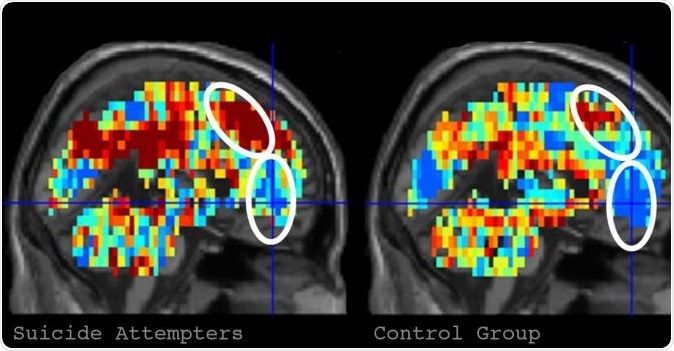According to a new study suicidal individuals could be identified using brain scans. The study led by Marcel Just, Professor of Psychology, Dietrich College of Humanities and Social Sciences from Carnegie Mellon University and David Brent from University of Pittsburgh have devised this innovative method to identify suicide prone individuals based on their attitude and how their brain reacts to negative ideas such as cruelty, death and problems. The study is published in the journal Nature Human Behaviour.

On the left is the brain activation pattern for "death" in participants who had made a suicide attempt. The image in the right depicts the activation pattern for "death" in control participants. Image Credit: Carnegie Mellon University
The authors have explained that this could be a new approach to assessment of psychiatric diseases and conditions. They add that suicide risk is one of the most difficult conditions to be assessed and predicted. In the United States, it is the second leading cause of death among the youth, the study says. Professor Just says that there are alterations in persons who have “suicidal ideation and behavior”. A machine based algorithm has been used in this study to assess that changes brought about by suicidal ideation. He explained that this technique gives a “window into the brain and mind, shedding light on how suicidal individuals think about suicide and emotion related concepts”. The study can predict if someone is considering suicide by their reaction to “death related topics” he explained.
The study participants were two groups – one of 17 people who were known to have had suicidal thoughts and ideas and the other of 17 neurotypical persons. The 34 participants were then presented with 10 words related to death, 10 related to positive ideas and 10 related to negative aspects or problems and troubles. The algorithm then applied on a six word concept and measured the reaction to these words. A brain scan was used to assess the reaction. The algorithm divided the words into six concepts such as carefree, good, praise, trouble, cruelty and death and accordingly classified the participants. The algorithm went on to successfully identify the suicidal individuals with 91 percent accuracy according to the results of the study. The researchers went further to see if the algorithm could identify persons who had attempted suicide at least once previously from those who had only thought about it. This time the algorithm identified the nine who had earlier tried to commit suicide at least once with 94 percent accuracy.
Among the six concepts studied, the researchers had first looked at the neurological changes seen with emotions such as pride, anger, shame and sadness. These were called the emotional signatures. The machine could identify these signatures in the brain with 85 percent accuracy.
Dr. Brent said the study needs to be replicated in a larger population to be called robust and to translate the results into reality. But he added that this could be a useful tool for clinicians to “identify, monitor and perhaps intervene with the altered and often distorted thinking that so often characterizes seriously suicidal individuals.”
According to Just, the emotional signatures that were identified were the actual differences that were picked up by the machine or artificial intelligence. The words presented to the individuals, he explained evoked these emotions which were different among the ones who were at risk of suicide. “For example, the concept of 'death' evoked more shame and more sadness in the group that thought about suicide,” he said. They hope that this would save lives of hundreds who commit suicide by detecting them early and providing help.